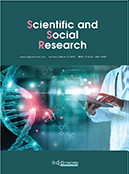Abstract
Prior research showed a potential link between religiosity and negative attitudes toward various marginalized populations, which raises the question of the impact of religiosity on implicit bias toward transgender individuals. The principal purpose of this study was to examine whether there was a significant relationship between religiosity and implicit bias toward transgender individuals. To address this research question, a diverse sample of participants was recruited and data was collected through surveys and assessments. After data collection, the collected data was subjected to rigorous statistical analyses to explore the potential link between religiosity and implicit bias toward transgender individuals. The correlation between religiosity and implicit bias was 16% (95% CI = 15% to 16%). To examine this relationship, a linear regression model was employed, with religiosity levels as the independent variable and implicit bias scores as the dependent variable. Furthermore, the statistical analyses involved controlling for potential confounding variables, such as age and political ideology, to ensure that the observed relationship between religiosity and implicit bias was not influenced by other factors. Key statistical parameters were generated through regression analyses, including beta coefficients, P-values, and R-squared values, which provided important information about the strength and significance of the association between religiosity and implicit bias.
References
Stroumsa D, Shires DA, Richardson CR, et al., 2019, Transphobia Rather than Education Predicts Provider Knowledge of Transgender Health Care. Medical Education, 53(4): 398–407. https://doi.org/10.1111/medu.13796
Clements-Nolle K, Marx R, Katz M, 2006, Attempted Suicide Among Transgender Persons, Journal of Homosexuality, 51: 3 + 53–69, https://doi.org/10.1300/J082v51n03_04
Wood AW, Conley AH, 2014, Loss of Religious or Spiritual Identities Among the LGBT Population. Journal of Counseling & Development, 92(4): 389–397. https://doi.org/10.1002/j.2161-007X.2014.00044.x
Matsuki K, Kuperman V, Van Dyke JA, 2016, The Random Forests Statistical Technique: An Examination of its Value for the Study of Reading. Scientific Studies of Reading, 20(1): 20–33. https://doi.org/10.1080/10888438.2015.1107073
Gupta VK, Gupta A, Kumar D, et al., 2021, Prediction of COVID-19 Confirmed, Death, and Cured Cases in India Using Random Forest Model. Big Data Mining and Analytics, 4(2): 116–123. https://doi.org/10.26599/BDMA.2020.9020016
Flores AR, Haider-Markel DP, Lewis DC, et al., 2017, Challenged Expectations: Mere Exposure Effects on Attitudes About Transgender People and Rights. Political Psychology, 39(1): 197–216. https://doi.org/10.1111/pops.12402
Arceneaux K, 2012, Cognitive Biases and the Strength of Political Arguments. American Journal of Political Science, 56(2): 271–285. https://doi.org/10.1111/j.1540-5907.2011.00573.x
Dyck JJ, Pearson-Merkowitz S, 2014, The Contagion of Contact: Does Intergroup Contact Reduce Anti-Gay Prejudice?Social Science Quarterly, 95(3): 722–737. https://doi.org/10.1111/ssqu.12076
Allen O, 1989, A Linear Regression Model for the Analysis of Life Times. Statistics in Medicine, 8(8): 907–925. https://doi.org/10.1002/sim.4780080803
Meissner F, Rothermund K, 2013, Estimating the Contributions of Associations and Recoding in the Implicit Association Test: The ReAL Model for the IAT. Journal of Personality and Social Psychology, 104(1): 45–69. https://doi.org/10.1037/a0030734
Millet N, Longworth, J, Arcelus J, 2016, Transgender Population: A Systematic Review of the Literature. International Review of Psychiatry, 28(1): 44–57. https://doi.org/10.1080/09540261.2015.1106446
DeCoster J, Banner MJ, Smith ER, et al., 2006, Information Provided by Implicit and Explicit Tests. Journal of Experimental Social Psychology, 42(6): 686–694. https://doi.org/10.1521/soco.2006.24.1.5
Dunham Y, Srinivasan M, Dotsch R, et al., 2013, Religion Insulates Ingroup Evaluations: The Development of Intergroup Attitudes in India. Developmental Science, 16(5): 696–711. https://doi.org/10.1111/desc.12105
Kim PY, Locke MA, Shakil E, et al., 2023, Beliefs About Jesus’s Race, Implicit Bias, and Cultural Correlates Among Asian American College Students. Journal of Psychology and Theology, 51(3): 333–351. https://doi.org/10.1177/00916471231161585
Hughto JMW, Reisner SL, Pachankis JE, 2015, Transgender Stigma and Health: A Critical Review of Stigma Determinants, Mechanisms, and Interventions. Social science & medicine, 147: 222–231. https://doi.org/10.1016/j.socscimed.2015.11.010
